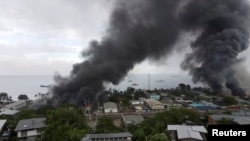Papua New Guinea has joined Australia in sending police officers to neighboring Solomon Islands after violent disturbances this week. The unrest has threatened to topple the government of Prime Minister Manasseh Sogavare.
Solomon Islands Prime Minister Manasseh Sogavare says his government is still in control but has asked Australia and Papua New Guinea for help to provide security.
Australia has sent a contingent of about 120 federal police officers and troops. Papua New Guinea has sent about 35 police and corrections officers.
The deployments follow days of violence and looting in the Solomon Islands.
This week smoke was seen rising from the capital Honiara's Chinatown district after demonstrators tried to storm the parliament. Police used tear gas and rubber bullets to disperse crowds demanding the resignation of Prime Minister Sogavare. He was elected leader for the fourth time in 2019.
Police said Saturday that three bodies were found in a burnt-out building in Honiara’s Chinatown district. The cause of the deaths is unclear.
Analysts say the current unrest has deep roots. Among the triggers have been long-standing ethnic tensions, allegations of official corruption, and disputes over the government's move to more closely align with China.
In 2019, the Solomon Islands switched its diplomatic allegiance from Taiwan to China.
James Batley is a former Australian High Commissioner to the Solomon Islands and a distinguished policy fellow at the Australian National University’s Coral Bell School of Asia Pacific Affairs.
He says community tensions over links with China have stoked the unrest.
"It is not foreign policy per se, but I think this diplomatic switch has fed into those pre-existing grievances and in particular the sense that the Chinese have interfered in politics in Solomon Islands, that Chinese money has somehow fostered corruption, has distorted the way politics works in Solomon Islands,” said Batley.
There were disturbances following national elections in the Solomon Islands in 2006. Much of Honiara's Chinatown was destroyed then because of speculation that businesses with ties to China had influenced the ballot.
Australia led a multinational peacekeeping mission to the Solomon Islands in 2003, and it maintained a security presence on the South Pacific archipelago until 2017.
The islands are 2,000 kilometers north-east of the Australian city of Brisbane.
The mostly Melanesian South Pacific nation is home to about 700,000 people and has about 120 Indigenous languages.






